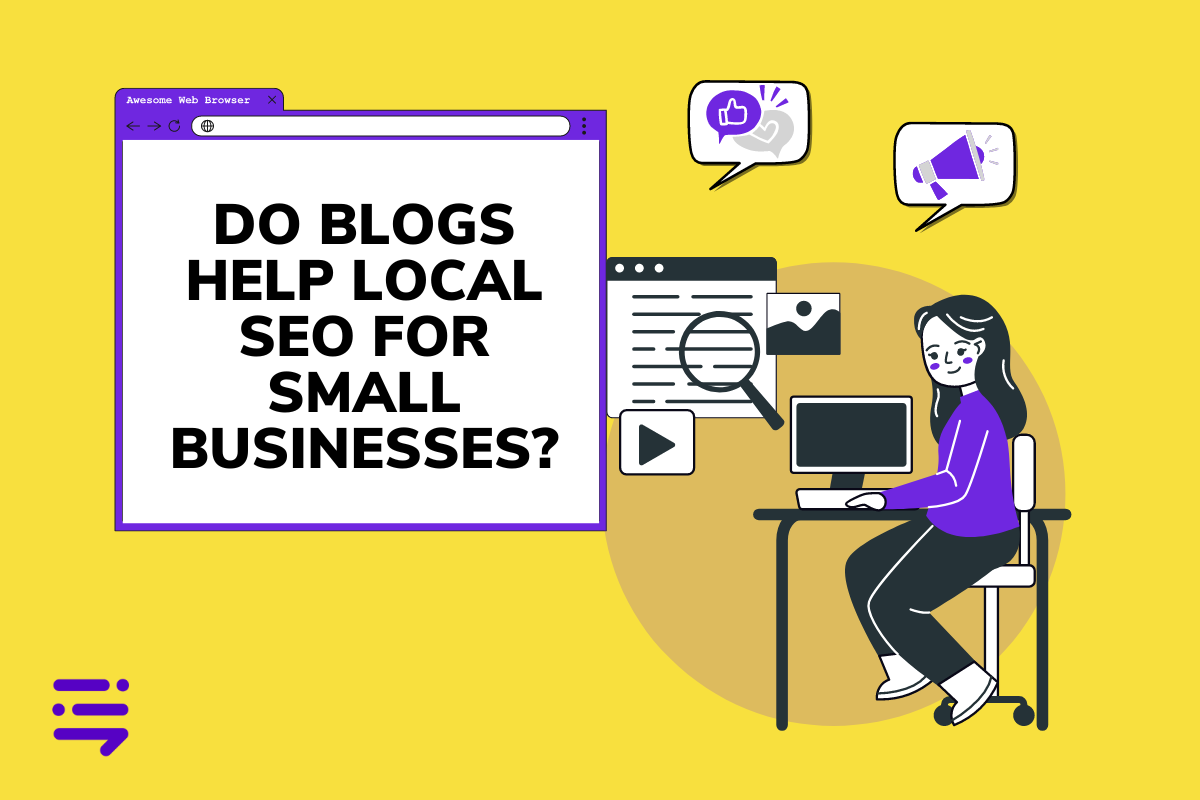Are you a small business owner looking to attract more local customers? Mastering local website SEO could be your secret weapon. Imagine your shop or service popping up right when someone nearby searches for what you offer. It’s like having a neon sign on a busy street, but online. This guide will break down the essentials of local website SEO in simple, actionable steps. You’ll learn how to make your website more visible in local searches, helping you connect with people right in your area. Stay with us, and you’ll discover how to turn online searches into foot traffic and sales. Ready to put your business on the local map? Let’s dive in.

Importance Of Local Seo
Local SEO is crucial for small businesses. It helps them stand out in local searches. People often search for services nearby. Local SEO makes sure your business appears in those searches. This increases visibility and attracts local customers.
Understanding local SEO is not complicated. It involves optimizing your online presence. This ensures you reach potential customers in your area. Small businesses benefit greatly from this targeted approach.
Why Local Seo Matters For Small Businesses
Local SEO connects businesses with nearby customers. It helps in building a community presence. With local SEO, small businesses can compete effectively. They can reach people who are more likely to become regular customers.
Impact On Local Search Rankings
Local SEO improves search rankings in your area. It focuses on geographic keywords. These keywords help your business appear in relevant searches. Improved rankings lead to more website visits and potential sales.
Boosting Local Traffic
Local SEO increases foot traffic to your business. More people find your business online. This boosts physical visits to your store or office. Local SEO is a powerful tool for driving local engagement.
Enhancing Online Visibility
Local SEO enhances your online presence. It makes your business visible on search engines. This visibility is key to attracting local customers. A strong online presence leads to increased trust and credibility.
Keyword Research For Local Seo
Local SEO keyword research helps small businesses find the right words to attract nearby customers. Focus on terms people in your area use. Tools like Google Keyword Planner can guide you to discover popular search phrases.
Keyword research is the foundation of successful local SEO for small businesses. It helps you understand what your potential customers are searching for and how they phrase their queries. By targeting the right local keywords, you can improve your visibility in search results and attract more local customers to your website.
Identifying Local Keywords
Start by thinking about the unique aspects of your business and location. Are there specific services you offer that are popular in your area? Include your city or neighborhood in your keywords. This could be as simple as “best pizza in Brooklyn” or “plumber in San Diego.” Consider what your customers might ask. If you own a bakery, they might search for “gluten-free cupcakes near me.” By putting yourself in their shoes, you get valuable insights into their search behavior. Engage with your customers directly. Ask them how they found you and what words they used online. This direct feedback can reveal keywords you might not have considered.
Tools For Keyword Research
There are several tools available to help you find local keywords. Google Keyword Planner is a great starting point. It offers insights into search volume and competition for different keywords. Use tools like Moz or SEMrush to analyze your competitors. See which keywords are driving traffic to their sites. This can help you identify gaps and opportunities for your own strategy. Don’t forget about Google’s autocomplete and related searches. These can be goldmines for discovering popular search phrases that you might not have thought of. By typing in a few words related to your business, you can see what Google suggests, which often reflects common searches. Which tools have you found most useful in your keyword research? Have you ever discovered a keyword by accident that turned out to be a traffic booster? Engaging with these tools and asking the right questions can unlock untapped potential for your local SEO strategy.
Optimizing Website Content
Optimizing website content is crucial for small businesses aiming for local SEO success. By tailoring your content to reflect local interests and using strategic keywords, your website can become a valuable resource for local customers. This not only improves your search rankings but also builds trust within your community.
Creating Localized Content
Localized content connects with your audience. Write blog posts about local events. Share success stories from local customers. Feature interviews with local personalities. These strategies help your audience relate to your brand.
Highlight local landmarks in your content. Create guides for tourists visiting your area. These tactics enhance your website’s relevance. Search engines favor websites that provide local insights.
Using Geo-targeted Keywords
Geo-targeted keywords improve your site’s visibility in local searches. Use your city or town name in your content. Include neighborhood names if applicable. This strengthens your website’s local presence.
Incorporate geo-targeted keywords naturally. Avoid keyword stuffing. Search engines penalize overuse of keywords. Focus on seamless integration within your content. This approach enhances readability and improves SEO.
Monitor keyword trends in your area. Use tools like Google Trends for insights. Adjust your strategy based on popular searches. This keeps your content relevant and engaging.

On-page Seo Techniques
On-page SEO techniques are crucial for local businesses. They enhance visibility and attract nearby customers. Implementing effective on-page strategies can boost your website’s search engine ranking. This section explores key methods to optimize your site.
Title Tags And Meta Descriptions
Title tags are the first thing users see in search results. They should be concise and include relevant keywords. Keep them under 60 characters to avoid truncation. Meta descriptions offer a brief summary of the page content. Aim for 150 to 160 characters. They should be compelling and contain local keywords. This helps search engines understand your content’s relevance.
Url Structure Optimization
Optimizing your URL structure improves your site’s crawlability. Use short and descriptive URLs. Include keywords that reflect the page’s topic. Avoid using complex symbols or numbers. Keep URLs simple and readable. Users should easily understand the page’s content from the URL. A well-structured URL contributes to better search engine rankings.
Google My Business Optimization
Boosting visibility on Google My Business can enhance local SEO for small businesses. Ensuring accurate business information helps customers find you easily. Regular updates and engaging content improve search rankings and attract more local traffic.
Optimizing your Google My Business (GMB) listing is crucial for enhancing your local SEO and attracting more customers to your small business. Your GMB profile acts like your digital storefront, making it vital to keep it updated and accurate. A well-optimized GMB listing can significantly improve your visibility in local search results and Google Maps, driving more foot traffic and inquiries.
Claiming And Verifying Your Listing
First things first, you need to claim your business on Google. If your business doesn’t have a GMB listing, you can create one. Claiming your listing is simple. Search for your business on Google and look for the “Own this business?” link. Click it and follow the prompts. Verification is the next critical step. You might receive a postcard from Google with a verification code. Enter the code online to verify your business. This ensures that you have control over the information people see about your business.
Adding Accurate Business Information
Once you’ve claimed your listing, make sure all your business details are accurate. This includes your business name, address, phone number, and website. Check that your hours of operation are correct. Imagine a customer showing up to find your store closed because of outdated information. Not a good look! Your business description should be clear and concise. Highlight what makes your business unique. This is your chance to attract and inform potential customers. Add photos of your storefront, products, or services. Visuals are compelling and can persuade someone to choose you over a competitor. Keep your information updated. If your hours change for a holiday, update them in GMB. Your customers—and Google—appreciate accurate information. What does your GMB listing say about your business? Take control of the narrative and make a stellar impression.
Building Local Citations
Local citations help small businesses improve their online presence. Listing your business on directories boosts local SEO. Ensure consistency in your business name, address, and phone number.
Building local citations is a crucial step in enhancing your small business’s online presence. Citations are essentially mentions of your business name, address, and phone number (NAP) on various websites and directories. They not only help improve your local search engine rankings but also increase your business’s credibility and visibility in your community.
Listing On Local Directories
Getting your business listed on local directories is one of the easiest ways to build citations. Think of platforms like Yelp, Yellow Pages, or even local chamber of commerce websites. Each listing acts as a vote of confidence for your business, enhancing your credibility. Ensure your information is complete and accurate on each directory. Include your business name, address, phone number, website, and a short description of what you do. Add photos if the platform allows it—people are more likely to trust a business they can see. Don’t just stop at the big names. Look for niche directories relevant to your industry or local area. These can provide valuable backlinks and help you stand out in more specific searches.
Ensuring Nap Consistency
Consistency is key when it comes to NAP information. Search engines like Google use this data to confirm your business’s legitimacy. If there’s conflicting information, it can hurt your ranking and confuse potential customers. Regularly audit your listings to ensure all information matches across platforms. This includes your website, social media profiles, and any online directories. Even small discrepancies, like using “St.” instead of “Street,” can have an impact. Using a spreadsheet or an online tool to track your listings can save you time and ensure consistency. It might seem tedious, but maintaining this consistency is crucial for building trust with both search engines and customers. Have you ever searched for a business and found multiple addresses or phone numbers? It’s frustrating, right? Don’t let your customers face the same confusion. Keeping your NAP consistent is a simple step that can significantly enhance your local SEO efforts.
Leveraging Online Reviews
Leveraging online reviews is a powerful strategy for local SEO, especially for small businesses aiming to make a mark in their community. Reviews not only influence potential customers but also impact search engine rankings. They build credibility, trust, and can help you stand out from your competitors. But how do you effectively harness this tool to boost your local SEO?
Encouraging Customer Reviews
Getting reviews isn’t just about hoping customers will leave one. You need to actively encourage them. Start by making the process simple. Use clear instructions and links to your review pages.
Offer small incentives like discounts or special offers for those who review your business. You might even share stories of how reviews have helped other customers make decisions.
Ask yourself: Are you asking at the right time? Timing matters. Catch your customers when they’re most satisfied, right after a purchase or experience.
Responding To Reviews Effectively
Every review deserves a response, whether positive or negative. Responding shows you value feedback and are engaged with your customers. A thank you to positive reviews can go a long way.
For negative reviews, address concerns promptly and professionally. Apologize if necessary and offer solutions. It can turn unhappy customers into loyal ones.
Reflect on this: Are your responses showcasing your brand’s personality? Consistent tone and style can further reinforce your brand image.
Online reviews are more than just feedback; they’re a conversation with your customers. Are you using them to strengthen relationships and improve your local SEO?
Local Link Building Strategies
Local link building is crucial for enhancing your small business’s online presence. It improves search engine rankings, drives traffic, and establishes credibility. Engaging with your community is key. Local link building can be achieved through collaborations and event participation. Let’s explore these effective strategies.
Collaborating With Local Businesses
Partner with nearby businesses for mutual benefits. Exchange links with local partners on your websites. Host joint promotions or events. This builds your network and earns valuable backlinks. These connections enhance your visibility in local searches. Collaboration can lead to long-term relationships. Build a supportive local business community.
Participating In Community Events
Join local events to gain exposure. Sponsor or participate in fairs, markets, or charity events. Event organizers often list participating businesses on their websites. This can provide valuable backlinks. Engage with attendees and network with other businesses. It boosts your reputation and fosters community ties. Participation in events makes your brand memorable.
Mobile Optimization For Local Search
Mobile optimization is crucial for local search in today’s digital age. Most users search for local businesses using mobile devices. Ensuring your website is mobile-friendly attracts more visitors. It improves your chances of higher local search rankings. This section explores how small businesses can optimize their sites for mobile.
Ensuring Mobile-friendly Design
Your website should adapt to different screen sizes. Use responsive design techniques. This ensures content adjusts seamlessly to various devices. Avoid using flash or outdated plugins. These can hinder mobile accessibility. Test your website on multiple devices. Make sure everything displays correctly. Use large buttons and easy-to-read fonts. This enhances user experience on smaller screens.
Improving Page Load Speed
Fast loading pages improve user satisfaction. They reduce bounce rates and increase engagement. Compress images to reduce file sizes. Optimize them without losing quality. Minimize HTTP requests by consolidating files. Use browser caching to speed up page loads. Invest in a reliable hosting provider. A good server ensures your website loads quickly.
Monitoring And Analyzing Seo Performance
Monitoring and analyzing SEO performance is a vital component of successful local website SEO for small businesses. It’s not just about setting up your strategies and hoping for the best; you need to keep a close eye on how they’re working. This process involves using analytics tools to gather data, and adjusting your strategies based on that data to continually improve your SEO efforts.
Using Analytics Tools
Analytics tools are like the dashboard of your SEO campaign. They provide you with crucial data on how your website is performing in search engines. Tools like Google Analytics and Google Search Console are invaluable for tracking things like website traffic, bounce rates, and keyword performance.
Have you ever wondered why some pages of your website get more traffic than others? Analytics tools can help you find out. They reveal insights into user behavior, showing which pages attract visitors and which ones might need a little more work.
Consider setting up regular reports to keep track of your progress. This way, you can spot trends over time and see the impact of any changes you make to your website.
Adjusting Strategies Based On Data
Data is powerful, but only if you use it. Once you have the information from your analytics tools, it’s time to put it to work. If you notice certain keywords driving more traffic, maybe you should focus on optimizing those further.
Or perhaps your bounce rate is higher than you’d like. This could indicate that visitors aren’t finding what they’re looking for. Use this insight to tweak your content or improve your website’s navigation.
Don’t be afraid to experiment with different strategies. If something isn’t working, adjust it. SEO is a dynamic field, and flexibility is key to staying ahead.
Have you made adjustments that resulted in noticeable improvements? Share your experiences and insights in the comments. Engaging with your audience can provide valuable feedback and foster community around your brand.

Frequently Asked Questions
What Is Local Seo For Small Businesses?
Local SEO optimizes your website to attract nearby customers. It focuses on improving visibility in local search results. Techniques include keyword optimization, Google My Business listing, and local backlinks. This strategy helps small businesses stand out in their community.
How Can I Improve Local Website Seo?
To improve local SEO, use local keywords in website content. Claim and optimize your Google My Business listing. Encourage customer reviews and build local backlinks. These steps enhance your visibility in local search results.
Why Is Google My Business Important?
Google My Business boosts your local SEO by increasing visibility in search results. It allows you to provide essential information, like business hours and location. Positive reviews on your listing improve credibility and attract more local customers.
What Are Local Backlinks In Seo?
Local backlinks are links from businesses in your area. They enhance your website’s authority and relevance in local searches. Collaborate with local businesses and participate in community events to earn valuable local backlinks.
Conclusion
Boosting your small business’s online presence locally is vital. Focus on keyword optimization. This attracts nearby customers who search online. Ensure your website is mobile-friendly and loads quickly. This improves user experience and search rankings. Encourage local reviews and engage with them. Positive reviews build trust and visibility. Use social media to connect with your community. Share updates and promotions regularly. Create local content that resonates with your audience. This can improve local search visibility. Monitor your SEO efforts and adjust strategies as needed. Success doesn’t happen overnight, but consistent effort pays off.
